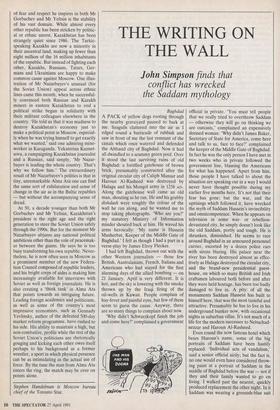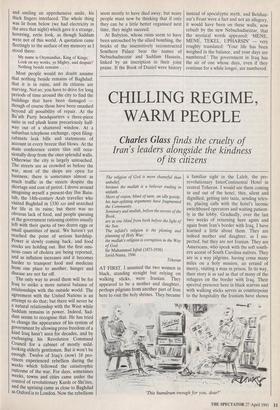THE WRITING ON THE WALL
John Simpson finds that conflict has wrecked the Saddam mythology Baghdad A PACK of yellow dogs rooting through the nearby graveyard paused to bark at me. Seagulls clattered into the air as I edged round a barricade of rubbish and saw in front of me the last remnant of the canals which once watered and defended the Abbasid city of Baghdad. Now it had all dwindled to a scummy green pool. Over it stood the last surviving ruins of old Baghdad: a fortified gatehouse of brown brick, presumably constructed after the original circular city of Caliph Mansur and Haroun Al-Rasheed was destroyed by Hulagu and his Mongol army in 1258 AD. Along the gatehouse wall came an old man, shouting as he ran. He and his grubby dishdash were roughly the colour of the wall he ran along, and he wanted me to stop taking photographs. 'Who are you?' my statutory Ministry of Information minder shouted back at him. He waved his arms heroically: 'My name is Hussein Musherbat, Keeper of the Middle Gate of Baghdad.' I felt as though I had a part in a verse-play by James Elroy Flecker.
I had left Baghdad, thrown out with the other Western journalists — those few British, Australasians, French, Italians and Americans who had stayed for the first alarming days of the allied bombing — on 21 January. April is very different. It is hot, and the sky is lowering with the smoke thrown up by the Iraqi firing of the oil-wells in Kuwait. People complain of hay-fever and painful eyes, but few of them seem to guess the cause. Anyway, there are so many things to complain about now.
`Why didn't Schwarzkopf finish the job and come here?' complained a government official in private. 'You must tell people that we really tried to overthrow Saddam — otherwise they will go on thinking we are outcasts,' complained an expensively dressed woman. 'Why didn't James Baker, Secretary of State for America, come here and talk to us, face to face?' complained the keeper of the Middle Gate of Baghdad. In fact he was the only person I have met in two weeks who in private followed the government line, blaming the Americans for what has happened. Apart from him, those people I have talked to about the situation are speaking out in a way I would never have thought possible during my earlier five months here. It's not that their fear has gone; but the war, and the uprisings which followed it, have wrecked the myth of Saddam Hussein's invincibility and omnicompetence. When he appears on television in some war- or rebellion- devastated city, he simply doesn't look like the old Saddam, portly and tough. He is shrunken, diminished. He seems to race around Baghdad in an armoured personnel carrier, escorted by a dozen police cars with sirens blaring. His palace near the river has been destroyed almost as effec- tively as Hulagu destroyed the circular city, and the brand-new presidential guest- house, on which so many British and Irish craftsmen laboured both before and after they were held hostage, has been too badly damaged to live in. A pity: of all the monuments Saddam Hussein has built to himself here, that was the most tasteful and attractive. Presumably he has to live in his underground bunker now, with occasional nights in suburban villas. It's not much of a life for the modern successor to Nebuchad- nezzar and Haroun Al-Rasheed.
Even round the now famous hotel which bears Haroun's name, some of the big portraits of Saddam have been hastily replaced. 'Individual acts of vandalism,' said a senior official airily; but the fact is, no one would even have considered throw- ing paint at a portrait of Saddam in the middle of Baghdad before the war — not if they and their family wanted to go on living. I walked past the nearest, quickly produced replacement the other night. In it Saddam was wearing a greenish-blue suit and smiling an apprehensive smile, his thick fingers interlaced. The whole thing was lit from below (we had electricity in the area that night) which gave it a strange, hovering, eerie look, as though Saddam were not of this world. A quotation came fleetingly to the surface of my memory as I stood there:
My name is Ozymandias, King of Kings; Look on my works, ye Mighty, and despair!' Nothing beside remains . . . .
Most people would no doubt assume that nothing beside remains of Baghdad: that it is in ruins, and its citizens are starving. Not so; you have to drive for long periods of time around the city to find the buildings that have been damaged though of course those have been smashed beyond all possibility of repair. At the Ba'ath Party headquarters a three-piece suite in red plush leans precariously half- way out of a shattered window. At a suburban telephone exchange, open filing- cabinets leak bills and statements of account in every breeze that blows. At the main conference centre tiles still occa- sionally drop from the once splendid walls. Otherwise the city is largely untouched. The streets are as crowded as before the war, most of the shops are open for business; there is sometimes almost as much traffic in the streets despite the shortage and cost of petrol. I drove around imagining myself a present-day Ibn Batu- tah, the 14th-century Arab traveller who visited Baghdad in 1330 AD and searched for life in its ruins; but there was no obvious lack of food, and people queuing at the government rationing centres usually left with their quota of two dozen eggs or small quantities of meat. We haven't yet reached the point of serious hardship. Power is slowly coming back, and food stocks are holding out. But the first omi- nous cases of cholera are being reported, and as inflation increases and it becomes harder to transport food and medicine from one place to another, hunger and disease are not far off.
The only way to avoid them will be for Iraq to strike a more natural balance of relationships with the outside world. The agreement with the United Nations is an attempt to do that; but there will never be a natural relationship with the West while Saddam remains in power. Indeed, Sad- dam seems to recognise that. He has tried to change the appearance of his system of government by allowing press freedom of a kind Iraq hasn't seen for decades, and by exchanging his Revolution Command Council for a cabinet of mostly mild- looking elderly gentlemen. But it won't be enough. Twelve of Iraq's (now) 18 pro- vinces experienced rebellion during the weeks which followed the catastrophic outcome of the war. For days, sometimes weeks, towns and cities came under the control of revolutionary Kurds or Shi'ites, and the uprising came as close to Baghdad as Oxford is to London. Now the rebellions seem mostly to have died away; but many people must now be thinking that if only they can be a little better organised next time, they might succeed.
At Babylon, whose ruins seem to have been untouched by the allied bombing, the bricks of the insensitively reconstructed Southern Palace bear the names of Nebuchadnezzar and Saddam Hussein, linked by an inscription in their joint praise. If the Book of Daniel were history instead of apocalyptic myth, and Belshaz- zar's Feast were a fact and not an allegory, it would have been on these walls, now rebuilt by the new Nebuchadnezzar, that the mystical words appeared: `MENE, MENE, TEKEL, UPHARSIN' — very roughly translated: 'Your life has been weighed in the balance, and your days are numbered.' The government in Iraq has the air of one whose days, even if they continue for a while longer, are numbered.



















































 Previous page
Previous page